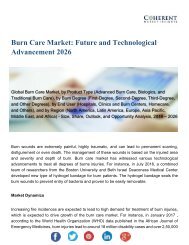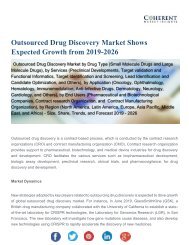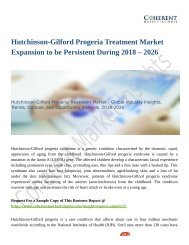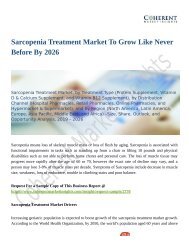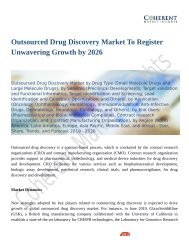Gastrointestinal Devices Market Demands and Growth Prediction 2018 to 2026
Gastrointestinal means pertaining to the intestines and stomach. A tract is a group of anatomic structures or a sequence of associated body organs. Gastrointestinal disease refers to diseases that involve gastrointestinal tract such as the stomach, esophagus, small intestine, rectum, and the large intestine.
Gastrointestinal means pertaining to the intestines and stomach. A tract is a group of anatomic structures or a sequence of associated body organs. Gastrointestinal disease refers to diseases that involve gastrointestinal tract such as the stomach, esophagus, small intestine, rectum, and the large intestine.
You also want an ePaper? Increase the reach of your titles
YUMPU automatically turns print PDFs into web optimized ePapers that Google loves.
<strong>Gastrointestinal</strong> <strong>Devices</strong> <strong>Market</strong> Accrues<br />
Phenomenally by <strong>2026</strong> with a Staggering CAGR<br />
<strong>Gastrointestinal</strong> <strong>Devices</strong> <strong>Market</strong> – Global Industry Insights, Trends, Outlook, <strong>and</strong><br />
Opportunity Analysis, <strong>2018</strong>-<strong>2026</strong><br />
<strong>Gastrointestinal</strong> means pertaining <strong>to</strong> the intestines <strong>and</strong> s<strong>to</strong>mach. A tract is a group of ana<strong>to</strong>mic<br />
structures or a sequence of associated body organs. <strong>Gastrointestinal</strong> disease refers <strong>to</strong> diseases that<br />
involve gastrointestinal tract such as the s<strong>to</strong>mach, esophagus, small intestine, rectum, <strong>and</strong> the large<br />
intestine. It can also be related <strong>to</strong> other organs of digestion such as the liver, pancreas, <strong>and</strong> the<br />
gallbladder. The GI or gastrointestinal tract (also known as GI tract, alimentary canal, digestive tract,<br />
GIT, or gut) is the organ system within the human body as well as other animals which can take in<br />
food, digest it <strong>and</strong> absorb essential nutrients <strong>and</strong> energy, <strong>and</strong> excretes the waste as urine <strong>and</strong> feces.<br />
All bilaterians (animals having a bilateral symmetry) have a GI tract. Primarily, it is a tube that can<br />
transfer food <strong>to</strong> various organs of digestion. In case of large bilaterians, the alimentary canal generally<br />
has an exit, by which the animal is able <strong>to</strong> dispose of feces. However, some bilaterians that are small in<br />
size have no exit or opening <strong>and</strong> they dispose of solid wastes by mouth or other means.
<strong>Gastrointestinal</strong> devices used <strong>to</strong> examine the internal lining of the GI tract are termed as gastrointestinal<br />
devices. An infection or abnormality in the basic functioning of this gastrointestinal tract is identified<br />
by gastrointestinal devices. The device is useful for detecting the root cause of many ailments<br />
concerning the gastrointestinal tract, such as vomiting, abdominal bleeding, persistent pain, tumor, <strong>and</strong><br />
inflammation that affects the esophagus, s<strong>to</strong>mach, <strong>and</strong> duodenum. In addition <strong>to</strong> detection,<br />
gastrointestinal devices also help in treating these diseases. Gastroesophageal reflux disease, colon<br />
cancer, ulcer, hemorrhoids, diverticulitis, Crohn’s disease, <strong>and</strong> bowel syndrome are some of the<br />
examples GI disease. Higher prevalence of these diseases due <strong>to</strong> high consumption of fast food <strong>and</strong><br />
sedentary lifestyle are projected <strong>to</strong> drive growth of the overall gastrointestinal devices market.<br />
Ask For a Sample Copy of This Business Report :<br />
https://www.coherentmarketinsights.com/insight/request-sample/185<br />
Increasing recognition of minimally-invasive procedures is projected <strong>to</strong> drive growth of the global<br />
gastrointestinal devices market during the forecast period. Conventional open surgeries can lead <strong>to</strong> a<br />
number of complications, which have forced the health centers <strong>to</strong> go for gastrointestinal devices<br />
throughout the globe. For instance, conventional open surgeries may cause a variety of post-operation<br />
complications such as blood clots, fatigue, pain, infections, <strong>and</strong> muscle atrophy. Some of the other<br />
fac<strong>to</strong>rs driving the rising acceptance of minimally invasive surgeries are lower risks (post operation),<br />
lower cost <strong>and</strong> hospital stay, faster recovery period, <strong>and</strong> rapid results. These fac<strong>to</strong>rs are projected <strong>to</strong> fuel<br />
the overall growth of the gastrointestinal devices industry.<br />
Some of the companies operating in the gastrointestinal devices market in the current scenario are<br />
Bos<strong>to</strong>n Scientific Corporation, Johnson & Johnson Ltd., Covidien Ltd., Fujinon Ltd., Stryker<br />
Corporation, Conmed Corporation, Medtronic, Karl S<strong>to</strong>rz, <strong>and</strong> Olympus Corporation.<br />
Increasing prevalence of gastroesophageal reflux disease <strong>and</strong> increase in colorectal cancer <strong>to</strong><br />
drive growth of the overall gastrointestinal devices market<br />
According <strong>to</strong> a report published by Healthline in 2012, pregnant women <strong>and</strong> persons above the age of<br />
40 years are at a higher risk of gastroesophageal disease. The report further states that 25% of pregnant<br />
women experience symp<strong>to</strong>ms of the disease, <strong>and</strong> it increases with time. Around 65% of patients who<br />
suffer from acid refluxes are 40 years of age or older. The occurrence of gastroesophageal reflux
disease, especially in North America is growing at an alarming rate. This is mainly attributed <strong>to</strong> the<br />
sedentary lifestyle <strong>and</strong> high consumption of fast food in the region. According <strong>to</strong> the American Cancer<br />
Society, in 2017, colorectal cancer is expected <strong>to</strong> lead <strong>to</strong> 50,260 deaths in the U.S. Therefore, the<br />
gastrointestinal devices market in this region is expected <strong>to</strong> grow at a significant rate over the forecast<br />
period. Click To Read More On Erythropoietin Drugs <strong>Market</strong>.<br />
About Coherent <strong>Market</strong> Insights:<br />
Coherent <strong>Market</strong> Insights is a prominent market research <strong>and</strong> consulting firm offering action-ready<br />
syndicated research reports, cus<strong>to</strong>m market analysis, consulting services, <strong>and</strong> competitive analysis<br />
through various recommendations related <strong>to</strong> emerging market trends, technologies, <strong>and</strong> potential<br />
absolute dollar opportunity.<br />
Contact Us:<br />
Mr. Shah<br />
Coherent <strong>Market</strong> Insights<br />
1001 4th Ave, #3200<br />
Seattle, WA 98154<br />
Tel: +1–206–701–6702<br />
Email: sales@coherentmarketinsights.com



